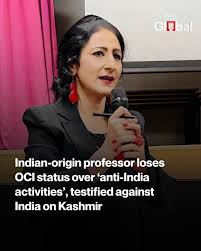Exploring the Work of Nitasha Kaul: Scholar and Activist

Introduction
Nitasha Kaul is an influential scholar, activist, and political economist known for her profound insights into the socio-political dynamics of Kashmir. Her work spans across various disciplines, including international relations, development studies, and political economy, making her a leading voice in contemporary debates surrounding South Asia and conflict regions. With the ongoing political turmoil in Kashmir and the Internet shutdowns that have dominated headlines, understanding Kaul’s contributions to these discussions has never been more relevant.
Academic Contributions
Nitasha Kaul is a lecturer in Politics and International Relations at the University of Edinburgh. Her research critically examines issues such as nationalism, state violence, and the impact of economic policies on marginalized communities. Kaul’s scholarly work often highlights the intersection of gender and racial politics, particularly as they pertain to Kashmir and its inhabitants.
Her recent publications include works on the implications of military governance in Kashmir, the role of digital media in activism, and the broader international implications of the Kashmir conflict. Through her papers and books, Kaul not only sheds light on the struggles faced by the Kashmiri people but also amplifies the voices of those who have been historically silenced.
Activism and Public Engagement
In addition to her academic work, Nitasha Kaul is a prominent advocate for Kashmiri rights, leveraging her platform to raise awareness about the human rights violations occurring in the region. She engage with various organisations and speaks at international forums, where she calls for global accountability and action regarding the crisis in Kashmir.
Her work has been recognised beyond academia, with Kaul being featured in numerous media outlets discussing the socio-political realities of Kashmir. She plays a vital role in mobilising support for those resisting oppression through peaceful means, bringing international attention to the issues at stake.
Conclusion
Nitasha Kaul’s contributions to the discourse on Kashmir and its political implications highlighted the urgent need for more nuanced understanding of conflict, identity, and state policy. As global focus remains on the region, her scholarship and activism are crucial in shaping public sentiment and policy discussions. In the coming years, her work may significantly influence how the international community approaches the Kashmir issue, advocating for justice and recognition of rights for the people in this contested region.








